- You are here:
- Home »
- Blog »
- RVing 101
- » How Much Does a Travel Trailer Weigh?
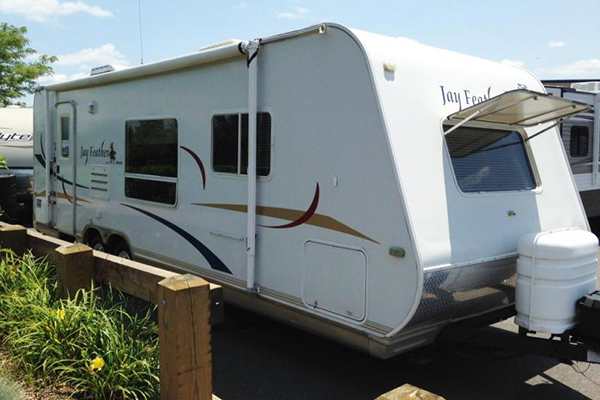
How Much Does a Travel Trailer Weigh?
The most common scenario in which people ask how much travel trailers weigh is when they are trying to figure out whether their car can tow one. And they’re usually looking for a quick answer. So to make a long story short — the average weight of a travel trailer is around 5,200 lbs.
If only the answer were that simple.
Namely, we should keep in mind that this number refers to dry weight, and it can vary significantly. In fact, we can expect to add about 1,500 lbs in additional weight. Basically, the final weight of our travel trailer will depend on a number of things.
Indeed, there’s much more to determining travel trailer weight than fits in a single paragraph. That’s why we’ve decided to look into all the possible factors that could affect the final number on the truck scale. We’ll discuss everything — the length, understanding weight categories, weighing the trailer, reducing the weight, etc.
We won’t say in advance that this is the ultimate guide to understanding the average weight of a travel trailer. But it should come close to being one. Without further ado, we give you our handbook on travel trailer weight.
Weight Factors In a Travel Trailer
As we have said, our goal is to discuss all the things that affect the overall weight of a travel trailer. Among them are:
- Construction materials
- Generator
- Battery
- Water
- Motorized slide-outs
Hopefully, understanding how much they can add would help us control and limit the weight increase. We’ll discuss them more closely in the following paragraphs.
Construction materials
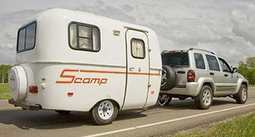
Now, the weight that the construction material brings into the equation technically counts as dry weight. However, knowing how much it actually adds to the overall number might be a good idea.
For instance, a fiberglass travel trailer typically needs aluminum structuring, which is generally lightweight. On the other hand, wood can add up to 900 lbs to the overall weight result.
Generator
Although a generator is a must-have on a long camping trip, we can’t ignore the additional weight that it brings to our travel trailer. Namely, the lightest power generators on the market rarely weigh below 300 lbs.
Battery
The battery is yet another gear item that we absolutely need in our travel trailer. Usually, it weighs somewhere between 50 and 65 lbs, depending on the size of the vehicle.
Water
Every travel trailer on the market comes with a freshwater tank. On average, that tank can store around 48 gallons of water. If we know that a gallon of water weighs 8lbs, we should add about 400 lbs of extra weight right from the start.
Motorized slide-outs
We generally consider slide-outs to be a handy addition to a travel trailer. However, we should keep in mind that a single slide can add an average 800 lbs to the overall weight of our vehicle. On the other hand, pop-outs, the non-motorized version, add an insignificant amount of extra weight and might be a better choice.
Understanding the Travel Trailer Weight Definitions
We understand very well how overwhelming it can be to try and figure out the numbers that the manufacturers provide. Crunching the numbers to determine our weight limit is difficult enough, and salespeople are often of no help whatsoever. So, let’s talk about the important abbreviations.
GVWR
The Gross Vehicle Weight Rating refers to the maximum weight a recreational vehicle can support. Aside from dry weight, the GVWR includes the weight of the driver and the passengers, as well as the weight of water, fuel, and gear. It is important to note that our towing vehicle and our travel trailer will have two separate GVWRs.
GAWR
The Gross Axle Weight Rating refers to the maximum load that the RV’s axle can carry. The GAWR depends on the axle, tires, and wheels. It is based on the weakest link, and the manufacturer usually provides the rating.
GCWR
The Gross Combination Weight Rating is what we need to look at if we want to know the combined rating of our towing vehicle and our RV. Basically, it’s the maximum combined weight limit.
UVW
The Unloaded Vehicle Weight stands for the weight of the travel trailer when it’s fully unloaded. So far, we’ve referred to UVW as dry weight. Therefore, we understand that it is, in fact, the weight of the travel trailer without any additional gear on it.
NCC
The Net Carrying Capacity refers to the overall weight of things we load onto the travel trailer. It implies the combined weight of the equipment, water, fuel, and food.
SCWR
The Sleeping Capacity Weight Rating designates the maximum weight limit depending on the number of sleeping positions. It is defined by the manufacturer, and the average individual sleeper weight is set at around 154 lbs.
CCCC
The Cargo Carrying Capacity defines the weight of the travel trailer without the optional equipment and accessories.
Travel Trailer Bumper Weight Capacity
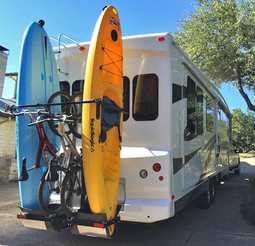
Sometimes, and especially if RVing is a lifestyle for us, we’ll want to attach some extra cargo onto the back of our trailer. For example, many campers love being able to go for a mountain bike ride, so they take their two-wheelers with them on every road trip.
Now, the bikes will obviously not go into the travel trailer. Similarly, we can’t just put them on the top. So, we have to get a hitch and a rack and attach them to the back of our trailer.
But how do we know if our bumper can hold the weight we intend to put on it?
The answer here is quite simple. If we can’t locate a sticker stating the capacity of the bumper, we have to call the manufacturer to get the specs. It is of the utmost importance that we make sure our desired hitch and our bumper are compatible.
Travel Trailer Weight vs. Length
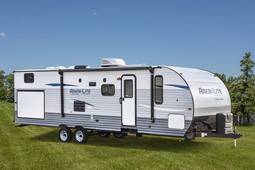
Generally speaking, travel trailer length ranges between 17 and 40 ft. We can say with near certainty that the weight of a trailer is proportional to its length. Simply put, the longer the trailer, the heavier it is.
That, however, is not a rule written in stone. Namely, more recent models are usually made of lighter materials, and that certainly affects the overall weight. Basically, we’d say that the weight of the trailer is inversely proportional to its year of production.
To put what we’ve just said into perspective, let’s examine a few examples.
For instance, there are numerous 16-feet travel trailers with an older manufacture date that weigh between 2,200 and 3,400 lbs. However, more recent models of a similar or same length tip the scales way below those numbers. In fact, we were able to find models that weigh incredible 1,500 lbs.
The length itself, though important, is only a part of the equation. Other factors that affect the weight of a travel trailer are the floor plan, as well as the position of the kitchen, bathroom, windows, and doors. In fact, even the type of furniture and appliances affects the overall number.
Let’s inspect some real-world examples that will, hopefully, help us get an idea of what we should expect. However, we need to keep in mind that the numbers below refer exclusively to dry weight.
Small Travel Trailers Weight
- Forest River Flagstaff E-Pro 12RK — 11 ft; 1,150 lbs
- ALiner Ascape ST — 13 ft; 1,575 lbs
- Forest River Flagstaff E-Pro 14FK — 14 ft; 1,495 lbs
- KZ Sportsmen Classic 150BH — 17 ft; 2,260 lbs
- Jayco Hummingbird 16FD — 18 ft; 2,535 lbs
- Jayco Hummingbird 16MRB — 19 ft; 2,780 lbs
- KZ Sportsmen Classic 180BH — 20 ft; 2,620 lbs
- Forest River Flagstaff E-Pro 19FD — 20 ft; 2,825 lbs
Longer Travel Trailers Weight
25 ft Travel Trailer Weight
- Keystone RV Passport 2200RBWE Grand — 3805 lbs
- Keystone RV Passport 234QBWE Express — 3870 lbs
- Keystone RV Passport 239ML Express — 4140 lbs
30 and 31 ft Travel Trailer Weight
- Keystone RV Passport 2670BH Grand Touring — 30 ft; 5344 lbs
- Prime Time RV LaCrosse 2911RB — 31 ft; 6516 lbs
35 and 36 ft Travel Trailer Weight
- Forest River RV Flagstaff Classic Super Lite 831CLBSS — 35 ft; 8105 lbs
- Forest River RV Flagstaff Classic Super Lite 832FLBS — 35 ft; 8621 lbs
- Prime Time RV LaCrosse 318BHS — 36 ft; 8022 lbs
Popular Travel Trailer Weight Examples
Travel trailers weighing less than 1500 lbs
- The Little Guy Trailers MeerKat — 900 lbs
- The Tiny Camper Company Stand Up Spam — 980 lbs
- The Relic — 1,000 lbs
- Weiscraft Little Joe — 1,100 lbs
- Forest River Rockwood Geo Pro 12RK — 1,164 lbs
- Riverside Retro 509 Jr — 1,180 lbs
- Rustic Trail Teardrops Polar Bear — 1,365 lbs
Travel trailers weighing less than 2000 lbs
- Forest River Flagstaff E-Pro 12RK — 1,133 lbs
- Jayco Hummingbird 10RK — 1,545 lbs
- Forest River Rockwood Geo Pro 12SRK — 1,763 lbs
- Riverside Retro 155XL — 1,937 lbs
- Palomino PaloMini 132FD — 1,979 lbs
Travel trailers weighing under 3500 lbs
- Forest River Rockwood Geo Pro 14FK — 2,259 lbs
- Jayco Hummingbird 16MRB — 2,780 lbs
- Palomino PaloMini 177BH — 2,842 lbs
- Forest River Flagstaff E-Pro 16BH — 2,874 lbs
- Forest River Flagstaff E-Pro 17PR — 3,161 lbs
- Keystone Passport 175BH Express — 3,255 lbs
Travel trailers weighing less than 5000 lbs
- Keystone Passport 195RB Express — 3,805 lbs
- Keystone Passport 234QBWE Express — 3,872 lbs
- Clipper Ultra-Lite 21BH — 4,069 lbs
- Clipper Ultra-Lite 21FQS — 4,576 lbs
- Gulf Stream Vista Cruiser 23BHS — 4,253 lbs
How Much Does a Fifth-Wheel Travel Trailer Weigh?
The answer to this question, we fear, is not a simple one either. The weight of a fifth-wheel trailer can vary anywhere from 7,000 to 20,000 lbs. To make things easier, manufacturers have split the fifth-wheels into three categories:
- Lightweight
- Midsize
- Full-size
Let’s see how much they weigh on average.
Lightweight Fifth-Wheel Travel Trailers
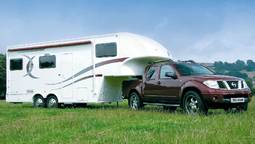
A fifth-wheel travel trailer that falls under this category can’t be more than 34 ft in length, and it can’t weigh more than 9,000 lbs. People who see camping as a leisure activity usually opt for these travel trailers, as they don’t take up too much space.
The most popular lightweight fifth-wheel models on the market are:
- Scamp 19’ Deluxe — 19 ft; 2,400 – 2,900 lbs (depending on the floor plan)
- Escape 5.OTA — 21.2 ft; 3,885 lbs
- Jayco Eagle HT 24.5CKTS — 29.5 ft; 7,530 lbs
- Forest River Arctic Wolf 265DBH8 — 31.9 ft; 8,284 lbs
- Grand Design Reflection 150 Series 290BH — 34 ft; 8,294 lbs
Grand Design Reflection 150 Series 290BH — 34 ft; 8,294 lbs
A half-ton pickup truck is strong enough to pull any of these travel trailers.
Midsize Fifth-Wheel Travel Trailers
The trailers in this category are typically between 33 and 41 ft long, with their average weight ranging anywhere from 10,000 to 14,000 lbs. They are usually the travel trailers of choice for people who go on longer camping trips. Namely, they have a wider array of floor plan options and more varied accessories.
Some of the most popular models include:
- Grand Design Reflection 337RLS — 35.6 ft; 10,570 lbs
- Heartland Pioneer — 39.8 ft; 11,010 lbs
- Grand Design Reflection 337RLS — 35.6 ft; 10,570 lbs
- Keystone Montana 3720RL — 39.7 ft; 13,329 lbs
When it comes to the towing vehicle that can handle these travel trailers, it’s safe to say that a three-quarter-of-a-ton to a one-ton truck would do the job.
Full-Size Fifth-Wheel Travel Trailers
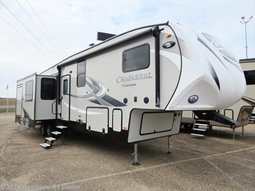
Campers who like to travel in comfort and luxury usually opt for the full-size fifth-wheels. Since they’re on the road most of the time, they’re not concerned with the fact that these trailers take up anywhere between 35 and 45 ft in length. When it comes to the weight limit, these luxury monsters usually weigh between 11,000 and 20,000 lbs.
The most prominent models at the moment are:
- Redwood RW390/3901MB — 40.2 ft; 14,510 lbs
- KZ Durango Gold G385FLF — 42.4 ft; 12,860 lbs
- Jayco Pinnacle 38REFS — 42.8 ft; 13,685 lbs
- DVR Luxury Suite 44 Memphis — 44.2 ft; 19,800 lbs
A vehicle lighter than a ton wouldn’t be able to move a full-size fifth-wheel travel trailer. In fact, manufacturers often recommend something with a diesel engine as a towing vehicle.
How to Find Travel Trailer Weight
Obviously, when we’re purchasing a travel trailer, we want to know its weight in order to match it to the towing capacity of our vehicle. People often wonder where they can find the weight information, and the answer is, in fact, quite simple.
There are three typical locations on a travel trailer where we should be able to find weight stickers:
- On the outside, front left-hand side of the trailer
- On the inside of the door
- Inside the travel trailer, usually on the inside of one of the cabinet doors
If we’re unable to locate the stickers ourselves, it’s best to talk to the salesperson before making a decision.
Best Way to Weigh a Travel Trailer
Unfortunately, years of experience have shown that we can’t entirely rely on the numbers we read in the brochures. Namely, manufacturers tend to be optimistic in terms of GVWR, which is a problem. They often fail to think about how much weight generators, batteries, etc. add to the trailer.
So the safest way to know exactly how much stuff we can load onto our trailer and how many passengers we can take is to measure it. Most often, people do this by driving their travel trailer to a local commercial weigh station, fully loaded and with passengers on board. When we say “fully loaded,” we mean food, water, camping gear, sleeping bags — everything that we want to bring along on the trip.
How to Weigh a Travel Trailer on the CAT Scale

Once at the weigh station, it is incredibly important that we follow the instructions we get from the staff.
We will first have to weigh the truck and the travel trailer with the weight distributing hitch hooked. During the weighing, it’s important that the truck’s steer axle is on the first measuring pad. Conversely, the rear axle should be on the second pad, while the axle of the trailer should be on the third pad.
Once the first weighing is done, we need to pull the trailer off the scale and remove the weight distributing hitch.
Then, we should weigh the truck and the trailer without the hitch hooked up. The hitch bars should, however, remain in the bed of the truck.
Once we’re done with the second weighing, it’s time to weigh the truck only. Needless to say, the travel trailer should not be on the scale.
It is important to note that during all three weighings, there should be no changes. Namely, the passengers need to sit still and no one should move anything around the trailer. That is the only way to get a realistic result.
In case some or all of our passengers are not available to participate in the weighing, we have to ask them to weigh separately. That way, we can simply add their body weight to the overall result we get.
A great thing about weighing the travel trailer on a CAT scale is that it is not only accurate but also cost-efficient. Most of the time, it costs about $10 for the initial weighing, while the reweighing is approximately $2.
Where Can I Get My Travel Trailer Weighed?
Commercial weigh stations are relatively easy to find. We should be able to find one in any town throughout the country.
Most often, truck stops, as well as moving and storage companies, offer the service of weighing trucks and travel trailers. In case they don’t, they would at least tell us where we should look next.
If all else fails, we could always check the local phonebook and its yellow pages.
How to Calculate the Travel Trailer Tongue Weight
Knowing how much our travel trailer weighs, as well as what our vehicle’s towing capacity is, is not enough. In order to safely tow a travel trailer, we ought to understand what its tongue weight is. Furthermore, we should learn how to calculate and adjust it.
Simply put, tongue weight is the downward force exerted from the trailer’s tongue onto the towing hitch. Basically, it allows us to control the trailer when towing it.
According to the industrial standards, tongue weight could range anywhere between 9% and 14% of the gross travel weight (GTW). Miscalculating it could pose a serious threat to the safety of the driver and the passengers. Namely, underestimating tongue weight could lead to trailer sway, which could, in turn, lead to a traffic accident.
While roughly calculating the tongue weight based on the percentage and GTW could give us a close enough number, we might want to double-check. For more precise results, we could try the following measuring methods:
- A tongue weight scale
- A bathroom scale (in case our trailer is lighter than 3,000 lbs)
- Visiting a commercial weigh station
How to Reduce the Travel Trailer Hitch Weight
Reducing the hitch weight can be tricky, but it is nevertheless doable. Again, we need to pay close attention to proper weight distribution. However, we also need to keep in mind that the initial weight of the hitch will depend on its design.
The safest way would be to use a Weight Distribution Hitch System. Namely, it will help distribute the load to all axles evenly, which will improve the overall control over the towing vehicle and the travel trailer.
Proper Travel Trailer Weight Distribution and Sway Control
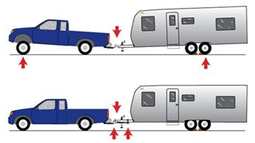
Proper Weight Distribution
We’ve already mentioned that an unevenly distributed weight in a travel trailer is dangerous. We need to do everything we can to avoid its negative impact both on the towing hitch and the trailer. Also, we need to make sure that the extra weight we add to the trailer doesn’t exceed the GVWR and GCVW.
The best way to do so is to properly distribute the additional weight front to back, along both the left and the right side of the trailer. That means that we should ensure that the heaviest pieces of our equipment, as well as the majority of our food and water supplies, are all placed as up front and close to the driver as possible.
If there could be any good news to improperly distributing additional weight in our trailer, it’s that it is usually visible to the naked eye. It’s quite similar to seeing a car in which one of the passengers is overweight — the whole vehicle tilts to one side. Why is this a good thing? Because we can easily fix things that we can see.
Generally speaking, most manufacturers provide an original design for proper weight distribution, so it’s best if we stick to it.
Sway Control
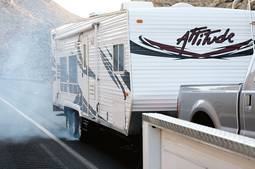
There’s hardly an RVer out there who can say that travel trailer sway is not a terrifying thing. Losing control while towing can lead to tipping at best. In worst case scenarios, serious accidents are often a consequence of trailer sway.
There are several things that cause travel trailer sway:
- Crosswinds and drafts from larger passing vehicles
- Drafts from going downhill while using an incorrect braking method
- Issues with weight and balance
Although the front of nearly every trailer is aerodynamic, the fact is that the sides aren’t. Crosswinds of 35 mph can exert around 3,440 lbs of force on the side of a trailer, causing it to sway or tip over.
While we can’t really control the winds, we can control the weight distribution, and we have discussed that already. By making sure that all the heavy equipment is resting on the hitch of the towing vehicle, we minimize the risk of the trailer swaying.
Tips to Reduce the Weight on Our Travel Trailer
It often happens that people pack their travel trailers and take them to the weigh station only to realize that they’ve maxed out on the allowed weight limit. In such cases, we need to be objective and perform an audit of the current situation in our trailer.
Getting Rid of Extra Stuff
Namely, we need to determine whether we really need everything we’ve loaded onto the trailer. Regardless of how we feel about it, we need to get rid of any extra tools, equipment or personal belongings that we deem unnecessary. Things like unused kitchen utensils, shoes, and clothes we’re not wearing, books we’re not reading — it all has to go.
Replacing RV Window Treatments
Much as we love our cool window treatments, the truth of the matter is that they’re adding extra weight to the trailer. So they have to go. Instead, we can use shades or roller window blinds.
Installing a Compost Toilet
Another great way to eliminate some extra weight is to get rid of our regular toilet and replace it with a compost one. Namely, the black tank holds a lot of liquid weight. What’s more, a regular toilet needs a lot of extra water in order to operate.
On the other hand, a compost toilet is incredibly lightweight even when it’s full.
Removing unnecessary cabinets, shelves, and drawers
Though this might seem a tad too extreme, it’s actually a great solution if we can’t decide which belongings to get rid of. We can take them out and replace them with lightweight plastic bins.
Getting rid of unnecessary exterior items
If we’ve been using the same travel trailer for years, we’ve certainly piled up a lot of stuff both in its interior and on its exterior.
For example, there is a great chance we have an old awning that we haven’t used in years. What’s the point in keeping it, then?
Similarly, we can get rid of other redundant things, such as an old satellite dish or the air conditioning unit that is simply too big.
Using aluminum for all repairs
Years of RVing are bound to result with an occasional hole in our travel trailer. When they do, we need to be wise. Using aluminum for repairs is a good idea for two reasons:
- It’s durable.
- It’s lightweight.
It’s easy to obtain flat sheets of aluminum, and any kind of structural repair should go incredibly smoothly with it.
Final Thoughts
This article has made it painfully clear that there is a multitude of factors we should pay attention to when figuring out the weight of our travel trailer. In fact, at times, it might seem like the whole thing is way too complicated for an inexperienced enthusiast.
However, we believe that the challenge of determining how much our travel trailer weighs is nothing compared to the joy we’ll feel while on the road with our family or friends. So let’s sum this all up.
An average travel trailer weighs approximately 5,200 lbs in dry weight. However, that number is not fixed, and it will vary a lot.
The weight of a travel trailer will depend on its length, construction materials, our food and fresh water supply, generator, and so on. The list may seem endless, but we need to factor everything in.
In order to determine what we can and can’t take with us, we need to understand the travel trailer weight terminology. That’s why we also used this article to discuss some common abbreviations found in manufacturers’ brochures.
The bottom line is that doing math should not prevent us from having fun on the road. RVing is a lifestyle, and stuff like weighing our travel trailer will become a routine in no time. Until then, we can always go back to this article for help.

